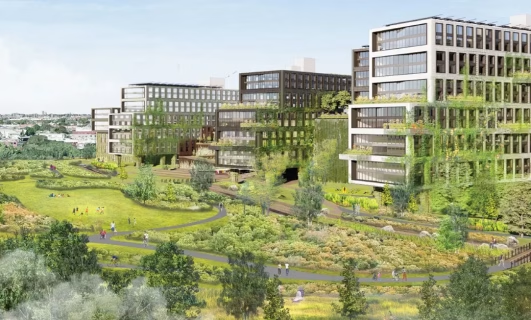A major redevelopment is on the horizon for Queens, as New York City has unveiled plans to transform the long-vacant site of the former Flushing Airport into a vibrant new community. The proposed project will deliver approximately 3,000 homes and 60 acres of public open space in College Point.
The project is being developed by New York City-based companies; Cirrus Workforce Housing and LCOR Incorporated. Upon completion, the project will have generated $3.2 billion in economic activity during the course of three decades.
Union construction jobs
Besides providing housing, the redevelopment will also produce over 1,300 union construction jobs and 530 permanent careers. The project will be constructed using 100% union labor, in part facilitated by investment from union pension funds.
Design
S9 Architecture, a New York–based design firm, is leading the architectural and design efforts for the Flushing Airport redevelopment. The studio created the aerial renderings and is overseeing the integration of residential buildings with expansive, park-like public spaces that blend into the surrounding wetlands.
Sustainability
Sustainability is top of mind for the plan. Developers have committed to integrating green building practices, testing mass timber use, and creating park-like landscaping that is accessible and blends in with the surrounding wetlands. Plans include nature trails, open space vistas, and areas for quiet recreation.
The land, idle since the Flushing Airport closed in 1984, has over the intervening years naturally reverted to wetlands conditions. The design being considered would strive to preserve and improve on this naturalistic state while providing for residence and public usage.
New York City Economic Development Corporation (NYCEDC) carried out the search for an appropriate developer through a competitive process. Construction is estimated to begin in 2028 following environmental review and Uniform Land Use Review Procedure (ULURP).
Joseph McDonnell, the managing partner of Cirrus Workforce Housing, was a strong advocate for the community goals of the project. “Cirrus is excited to collaborate with neighborhood leaders, labor unions, and residents to bring this innovative project to fruition,” he said.
The Flushing Airport redevelopment project is part of an overall city effort to increase the supply of housing. Along with projects at locations like 100 Gold Street and Gansevoort Square, and citywide zoning codes, this redevelopment is assisting the city in realizing its long-term goal of adding 500,000 new units by 2032.
Read also: New York City lays out plans for the largest mass timber residential project on Staten Island
Endorsed by unions
The project has been widely endorsed by unions. New York City District Council of Carpenters representative Paul Capurso said that the union is happy to endorse the project as a “win for New York’s working families” and a template for decent labor and affordable housing.
With its combination of housing, job creation, green design, and park space, the redevelopment of the former Flushing Airport is a significant investment in Queens’ future.
Read also: Gansevoort Square Set for Major Transformation with Housing and Cultural Hub

Flushing Airport Redevelopment Project: Project Factsheet
Project Overview
Location: Former Flushing Airport site, College Point, Queens, New York
Status: Planning phase – construction expected to begin in 2028
Development Details
Housing Units: Approximately 3,000 homes
Public Open Space: 60 acres
Site History: Former airport decommissioned in 1984, naturally reverted to wetlands
Current Status: Undergoing environmental review and Uniform Land Use Review Procedure (ULURP)
Key Developers
Cirrus Workforce Housing (New York City-based)
LCOR Incorporated (New York City-based)
Oversight: New York City Economic Development Corporation (NYCEDC)
Read also: Bravo Property Trust finances New York residential tower
Flushing Airport Housing: Economic Impact
Construction Jobs: 1,300+ union construction positions
Permanent Jobs: 530 long-term careers
Labor Commitment: 100% union labor with union pension fund investment support
Economic Activity: $3.2 billion projected over three decades
Sustainability Features
Green building practices integration
Mass timber construction exploration
Accessible, park-like landscaping
Wetlands preservation and enhancement
Nature trails and recreational areas
Open space vistas for public enjoyment
Read also: New York Gov. Hochul Announces $1 Billion Affordable Housing Investment

Leave a Reply